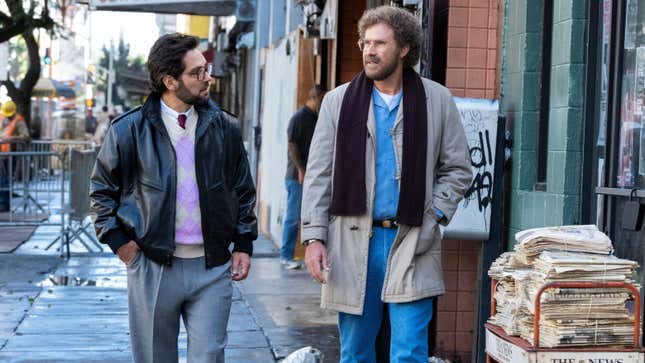
Paul Rudd will probably never age, so The Shrink Next Door gives him a hand. The new Apple TV+ series chronicles how Rudd’s Dr. Isaac “Ike” Herschkopf manipulates and invades into the personal life of his patient Martin “Marty” Markowitz’s (Will Ferrell) over 30 years. We watch as Dr. Ike goes from a cocky, Ralph-Lauren-shirt-loving therapist in the ’80s to a cocky, gray-haired senior citizen in present day.
It’s bewildering to see Ike promptly take over the finances of an unwitting Marty, who doesn’t realize he is giving up control of his business, family, and relationships in the name of a less-than-authentic friendship. It’s even worse knowing that this is a disturbing true story, which inspired journalist Joe Nocero’s popular 2019 podcast of the same name. Even for those familiar only with the broad strokes of what real-life Marty Markowitz went through, the series presents the frustrating case with great detail and insight.
The Shrink Next Door (and its source material) is a crushing cautionary tale about the importance of choosing the right therapist. No one is more vulnerable than while in therapy, which is meant to be a safe space to air out feelings, desires, and secrets without being judged. Ike quickly weaponizes his patient’s grief and insecurities. Marty recently lost his parents, his uncle is contesting his ability to run the family textile business, and he’s prone to panic attacks in social situations. Instead of helping him overcome these challenges, Ike amplifies them to become the only person in Marty’s orbit left to trust.
Any notions of patient-therapist boundaries are thrown out the window in the first episode. It’s clear that Ike’s congenial smile and attitude is an artful deception. He is far more conniving and selfish than any of his patients realize. The audience is aware from the get-go, so it’s alarming and oddly fascinating to witness the doctor charm his way into Marty’s world; it’s like watching a car crash in slow motion.
Ike quickly realizes Marty hails from a wealthy Jewish family, in contrast to his own scrappy upbringing; he pines for the lavish life he never had. The writers don’t drag out Ike’s motivations for conning his way into his clients’ lives: His ego and bank account constantly need boosting. To make his work easier, Ike tries to get photos with celebrities when he can—Brooke Shields, Gwyneth Paltrow, and Farrah Fawcett get shout-outs, while Lisa Rinna has a cameo. He isn’t acting on whims or delusions. The good doctor is a full-on scam artist.
The situation between the two escalates from Marty paying for his newfound therapist’s framed photos when the latter “forgets” his wallet, to Ike settling into Marty’s Hamptons beach house with his wife, Bonnie (Casey Wilson), and their twin daughters. Ike also renovates the house with Marty’s money to use as a theme party paradise under the guise of networking for the foundation the two have started. Imagine your therapist turning into your best friend and your business partner? It’s a nightmare.
The biggest question stemming from the show, and from the real Marty’s unfortunate journey, is why he let this happen to him for so long. Can a therapist really trick a seemingly intelligent client into paying $20,000 for an autographed baseball? It sounds implausible, but Ike’s control over all his patients is equivalent to that of a cult leader. For the first time in a long while, Marty gains confidence and feels a kinship. “[Ike] cares so much, his words are empowering and liberating,” Marty explains at one point. The strong camaraderie feels like a toxic relationship, where one dominating person has the upper hand, and the other is blinded by love and devotion.
Ferrell’s surprisingly somber performance is heartbreaking throughout—it’s understandable if viewers want to just jump in and shake him out of this predicament—but his work raises the question of what anyone else would do in his position. Marty’s existential crisis makes the show effective, even more so than its moments of dark humor.
Ike eventually convinces Marty to sever ties with his well-meaning sister Phyllis (Kathryn Hahn), a single mother of three going through her own hellish divorce. Phyllis is a voice of reason in Marty’s life, helping him run the textile company along with a group of trusted employees. Hahn is only in half the episodes, but she is delightful, imbuing the dialogue with biting wit or heartfelt pain as needed.

The series immerses audiences in the lives of its lead characters in order to elicit two distinct reactions: sympathy for one, indignation for the other. The tension that grows over eight hour-long episodes can feel redundant and aggravating at times, but the payoff is well worth it.
The show’s creators and stars sat down with the real Marty in preparation, but not Ike, whose license was finally revoked earlier this year. There’s no way to know how he’ll feel about the show, but it’s hard not to think he’ll boast about a good-looking actor of Rudd’s caliber playing him. Rudd’s casting is an excellent choice because his beguiling face is easy to trust, as we’ve seen in Clueless, Friends, as Marvel’s Ant-Man movies.
The actor evolves his depiction of Ike from the disarming veneer to a total curmudgeon over the course of the season. The story is told mostly from Marty’s perspective, but the rare moments when Ike drops his act and changes his facial expressions like an old-school villain is where Rudd truly shines. The makeup and prosthetics to age both actors is well done; Rudd adds to the believability by walking like his back is always in pain.
The Shrink Next Door doesn’t go deep in examining Marty’s psyche and how he gets entangled in this mess. An overly simplistic answer comes from something Phyllis says to him: “Getting used to it is your superpower.” But Marty’s inability to say no becomes a potent source of tension. It makes the otherwise engaging series uncomfortable to sit through—but perhaps that’s the point.